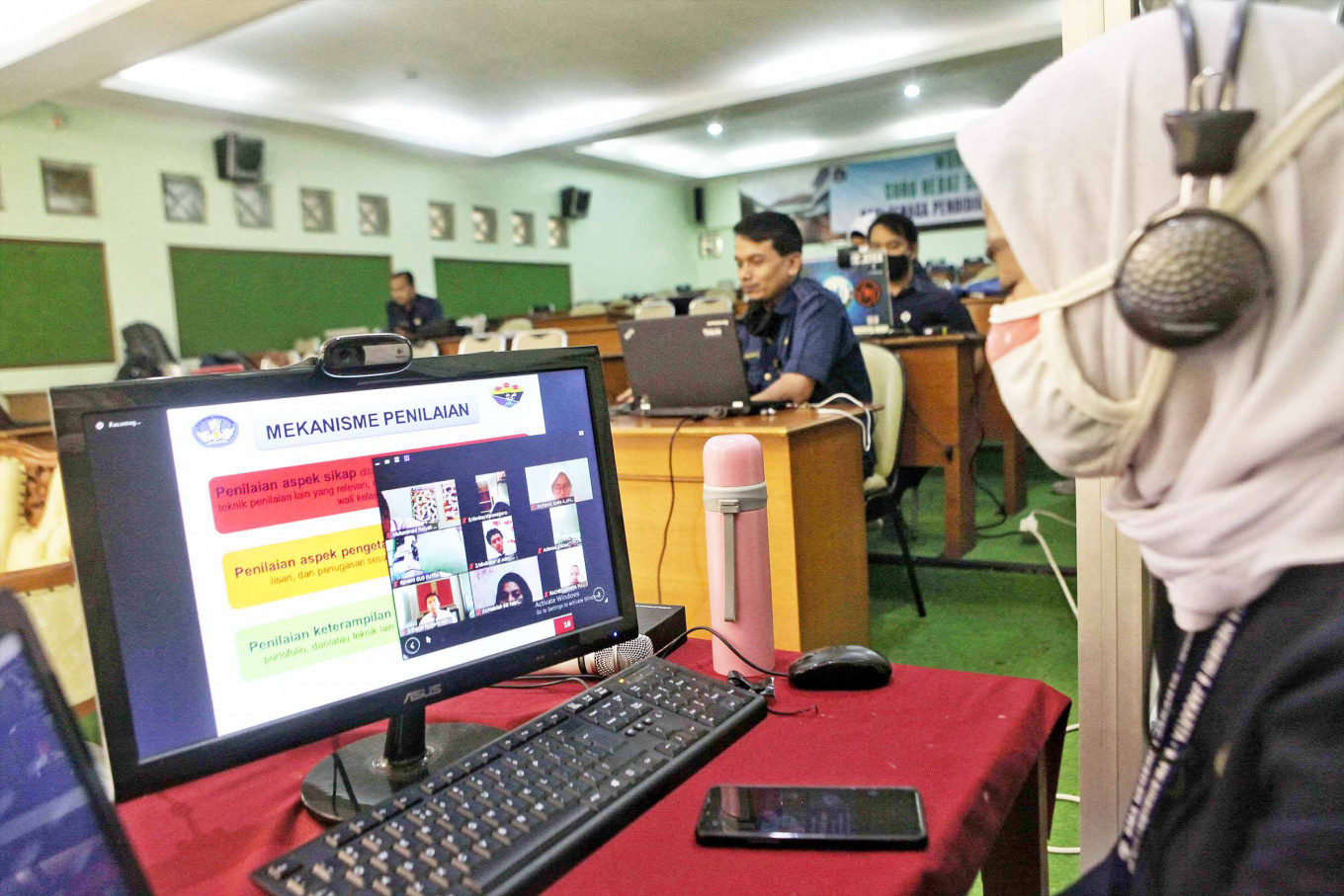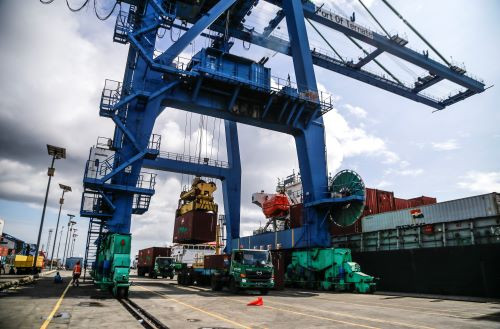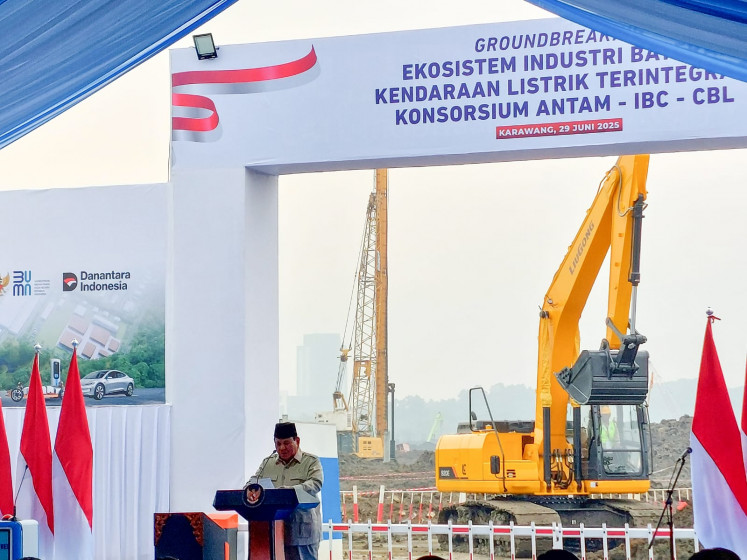Popular Reads
Top Results
Can't find what you're looking for?
View all search resultsPopular Reads
Top Results
Can't find what you're looking for?
View all search resultsCOVID-19 crisis opportunity for education reform in Indonesia
The current health crisis has forced the government to adjust its plans, but it is still determined to incorporate some of the strategies to keep progress in education on track.
Change text size
Gift Premium Articles
to Anyone
 Teachers from SMA 8 state high school in Bukit Duri, South Jakarta, speak to their students through video calls on the first day of the academic year on July 13. Classrooms have moved online to prevent the transmission of COVID-19. (JP/Seto Wardhana)
Teachers from SMA 8 state high school in Bukit Duri, South Jakarta, speak to their students through video calls on the first day of the academic year on July 13. Classrooms have moved online to prevent the transmission of COVID-19. (JP/Seto Wardhana)
T
he Indonesian education sector – a core element of national development – has overcome numerous challenges over the years, but nothing had prepared it for the unprecedented jolt from the COVID-19 pandemic.
As is the case with many other countries around the globe, Indonesia has been scrambling since earlier this year to ensure that the education system remains functional, albeit with necessary compromises to adjust to the current situation, such as replacing conventional, face-to-face learning with online classes.
However, the practical implementation of these emergency measures has been less than ideal amid the pre-existing socioeconomic disparities among teachers and students.
As the country approaches its 75th Independence Day, the questions linger: Will the education system survive the pandemic? What is to become of the Indonesian youth and the system in the future?
Education and Culture Minister Nadiem Makarim has said the government already devised a new education roadmap to realize President Joko "Jokowi" Widodo's vision to make Indonesia a developed country in 2045 prior to the pandemic, which would entail a systemic reform that was expected to transform the widely accepted notion of a curriculum, as well as to improve the quality of teachers.
The current health crisis has forced the government to adjust its plans, but it is still determined to incorporate some of the strategies to keep progress in education on track.
“The strategy for how to develop the next generation of leaders and the most productive members of society always stems from the education system,” Nadiem said during the Educating the Nation webinar, which was part of The Jakarta Post’s webinar series Jakpost Up Close on Wednesday.
“This is the highest return on investment that a country can make to actually [improve] the quality and productivity of its labor force and economy,” he said.
Teachers, he added, were an integral part of the system-wide transformation, given that the quality of education that students receive ultimately hinges on the quality of their teachers.
“The next generation of teachers are not only teachers who are smart, tech-savvy and have a passion for teaching, but also those who can be potential change agents,” Nadiem said.
He went on to say that the government has established a new training program that assesses leadership qualities among the existing crop of teachers, as the system requires a number of “superintendents” who are willing to train and therefore improve the quality of fellow educators.
Read also: Decision to reopen more schools draws ire from teachers
The ministry has also continued to push for the proper implementation of the Merdeka Belajar (Learning Independence) policy by granting teachers the freedom to focus only on the essential aspects of the present curriculum amid the COVID-19 emergency, he said.
“The concept of Merdeka Belajar also gives independence to teachers to be able treat the curriculum like a menu as opposed to a set course meal,” Nadiem said, adding that the policy also granted teachers the flexibility to redesign the curriculum in a way that suited the competence and interests of their students.
World Bank senior social development specialist Dewi Susanti said during the same event that, although the current circumstances might seem dire, the so-called “learning crisis” was not unique to Indonesia.
Read also: ‘Kids feel lonely’ amid extended remote learning period
That said, the country should step up its efforts to drastically improve its education sector for its own good, she said.
“Set learning as a goal and measure it periodically,” Dewi said. “Build on what works, and scale back what does not.”
According to data from the World Bank, Indonesia’s investment in education has increased over the past two decades, even reaching 20 percent of the state budget in the last 10 years.
However, the increased investment does not seem to have yielded any significant results, as evidenced by the fact that Indonesia ranked 87th on the World Bank’s Human Capital Index in 2018, lagging behind its neighbors in East Asia Pacific, Dewi said.
Anton Mailoa, the board chairman of Sinarmas World Academy, said the current situation served as a crucial reminder of the importance of constant communication among students, their parents and teachers to properly negotiate the most suitable education method given the circumstances.
“The key to success not only lies within schools, but also with everyone involved [in the education system],” he said.
Shintia Revina, a researcher at the SMERU Research Institute, said the government should aim for a gradual improvement instead of a sweeping change, as the latter could potentially further alienate students and educators alike.
“Critical thinking, for instance, is still too advanced a concept for many of our teachers to grasp,” she said.
“This is because the level of competence among teachers is relatively low, both in terms of their subject matter and pedagogical knowledge.”
Federation of Indonesian Teachers Association (FSGI) deputy secretary-general, Satriwan Salim, echoed a similar sentiment, saying that there was no one-size-fits-all solution to the issues currently plaguing the sector given that teachers and students across the archipelago came from different sociocultural backgrounds.
“The problems faced by teachers in Jakarta are different from those in remote areas,” he said.
“The real, practical problems that [teachers] encounter in their respective regions should serve as the basis of their training.”









